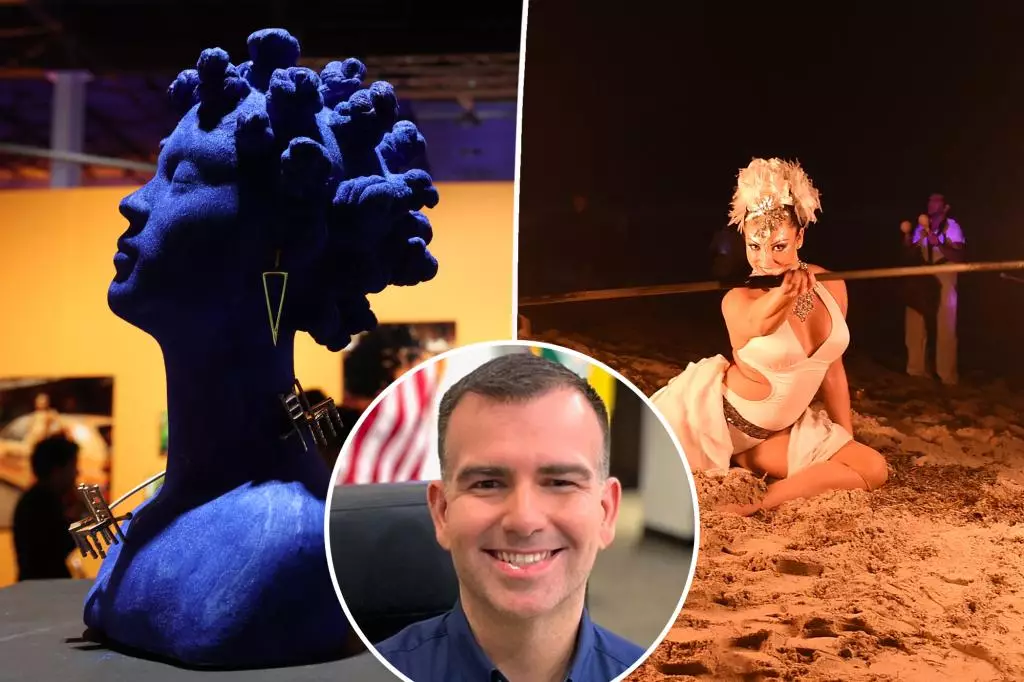As the vibrant shadow of Art Basel looms over Miami Beach, the luxury enclave is grappling with growing tensions between high-rolling party enthusiasts and city regulations aimed at preserving the quality of life for its residential communities. At the heart of this debate are three prominent homeowners known for their extravagant celebrations, who have launched a legal battle to contest the city’s newly enforced restrictions on large-scale events.
The upcoming legal challenge centers around three wealthy figures: Leonard Hochstein, famous for both his plastic-surgery expertise and reality television appearances, Sinan Tuna, CEO of Farmasi, and Daniel Vincent Liburdi, a resident with a penchant for opulence. Together, these individuals are seeking to secure their lavish soirees against a backdrop of regulations imposed on November 20 that demand permits for events featuring extensive setups like dance floors, firework displays, and sound systems. Their argument hinges on substantial financial commitments, having spent nearly $4 million collectively to create memorable experiences during Art Week, a time synonymous with creative expression and social festivities.
The cumulative expense of their annual traditions—Hochstein’s $300,000 and Tuna’s astounding $1.7 million—shines a spotlight on the depth of their investment into the city’s cultural fabric. With allegations that the regulations were hastily implemented and insufficiently advertised, their lawyer, Richard Wolfe, is raising alarms. Wolf’s colorful rhetoric claiming his clients might be targeted as if they were “raided by SWAT teams” certainly illustrates the heightened stakes surrounding the enforcement of these rules.
In contrast, Miami Beach’s city officials, led by Vice Mayor Alex Fernandez, are mounting a robust defense of the new regulations. They argue that the measures are necessary for maintaining public safety and preserving the tranquil quality of life that residents expect in their upscale neighborhoods. Citing a history of complaints regarding noise and congestion during large gatherings, Fernandez emphasizes the enforcement of boundaries around commercial-grade events. Although he acknowledges the allure of festivities during Art Week, he posits that celebrations must occur in a manner that considers local residents—especially families whose children need a peaceful environment to rest.
The concerns raised are not unfounded. Residents have recounted experiences where emergency services struggled to navigate the streets during peak party times—issues exacerbated by overflowing crowds and events that disrupt normal traffic. A last-minute influx of lawsuits from aggrieved homeowners indicates that discontent is brewing, fueled by a desire to protect their community from disruption.
The current legal maneuverings reflect a broader tension between economic opportunity and community integrity. For many, the allure of Art Basel extends beyond art; it encompasses a lifestyle represented by glamor and nightlife that has become synonymous with Miami Beach itself. Yet for others, including longtime residents and city officials, the celebratory fervor connected with such events presents challenges—not just in terms of noise levels but also in regard to safety and community welfare. Fernandez’s comments underscore a growing sentiment that the unchecked revelry associated with Art Basel may compromise the cultural reputation of Miami Beach, which prides itself on being both sophisticated and inviting to diverse audiences.
As the hearing scheduled for Monday approaches, the stakes could not be higher. Hochstein and the other plaintiffs must not only protect their financial investments in these high-profile parties but also contend with the growing scrutiny surrounding the nature of Art Week events altogether. The Vice Mayor’s assertion that unauthorized gatherings exploit Art Basel’s prestige illustrates a fear that the essence of this cultural event is at risk of being overshadowed by reckless celebration.
With Art Basel set to run from December 6 to December 8, the tensions surrounding these party regulations raise questions about the future of social events in Miami Beach. The push and pull between exuberant celebrations and community safeguards illustrates a complex dance of desires—one that embodies the cultural richness of Miami while pressing against the need for order and tranquility.
Whether the courts side with the affluent party hosts or uphold the city’s regulatory measures remains to be seen. However, what is undoubtedly clear is that the outcome of this legal challenge will shape the future of festivities in Miami Beach, influencing how art, culture, and community coexist in this vibrant, multifaceted locale. In this unique cultural conundrum, it appears that both sides may need to reconsider their approaches to harmoniously blend revelry with appropriate oversight.

Leave a Reply